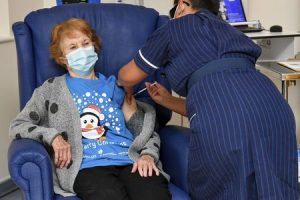California received its first batch of Covid-19 vaccinations and began vaccinating people according to recommendations from the California Department of Health. First, the vaccine is being given to health care workers and residents of skilled nursing facilities, assisted living facilities and similar facilities for older and medically vulnerable patients.
 Currently, there are more than 400,000 people living in skilled nursing facilities (nursing homes, rehabilitation centers, convalescent hospitals) in California. Questions arise over how to obtain consent for the vaccines for the elderly who suffer from dementia or Alzheimer’s or in some other way lack the capacity to give consent. Obtaining written consent from the patient him or herself would be the best, but that is not going to be possible for many residents of nursing home and assisted living facilities.
Currently, there are more than 400,000 people living in skilled nursing facilities (nursing homes, rehabilitation centers, convalescent hospitals) in California. Questions arise over how to obtain consent for the vaccines for the elderly who suffer from dementia or Alzheimer’s or in some other way lack the capacity to give consent. Obtaining written consent from the patient him or herself would be the best, but that is not going to be possible for many residents of nursing home and assisted living facilities.
People are worried about the safety of vaccines, and some discount the severity of the virus itself. The federal government has not provided clear direction on how to best encourage people to consent to taking the vaccine. It is easy to imagine that within families there might be disagreement over whether a loved one should be vaccinated in the first place. These disagreements will need to be worked out because there is an urgent need to vaccinate the elderly who are disproportionately affected by Covid 19 and require hospitalization at higher rates than the rest of the population when they do get infected.
It is imperative that residents and their family members receive information about the vaccines to decide whether to agree to the vaccine either on their own behalf or on the behalf of an elderly loved one. To give the facts about the Covid 19 vaccines, California has created an information page about the vaccines with answers to frequently asked questions: Vaccine Q & A. In addition, each vaccine maker will need to create an information sheet which will describe both the risks and the benefit of their vaccines. Skilled nursing facilities and residential care facilities are also conducting outreach and holding meetings for their residents and their family members and for their staff members via videoconferencing to provide information about the risks and benefits of the vaccines and to encourage all to consent to the vaccine.
Importantly, as the California Department of Health states on its question-and-answer webpage, vaccines will not give you Covid-19. Instead, the vaccine teaches your body how to fight off the virus and while it prevents you from getting sick and it also will prevent you from spreading of the virus to others. Vaccines that have been purchased by the government will be given at no cost. It is not mandatory that any person get the vaccine. The government will not force you or your loved one get one.
Charged with distributing the vaccine in many areas of the country, Walgreens and CVS will first seek written consent to the vaccine from a person, but if that is not available, the companies will give the vaccines based on verbal consent with an independent verification of that consent. For example, two nurses would contact by phone the family member with decision making power over the elderly person, and one nurse would obtain verbal consent and the second would act at a witness and the vaccine can then be administered.
If you have questions about taking the vaccine or about consenting to the vaccine on behalf of your loved one, our attorneys would be glad to speak to you, free of charge, and answer any questions, you have about your legal rights. Please contact us at Walton Law Firm at 760-571-5500 or toll free at 866-607-1325. Or you can reach us by filling out our online questionnaire.
 Southern California Nursing Home Abuse Lawyer Blog
Southern California Nursing Home Abuse Lawyer Blog








